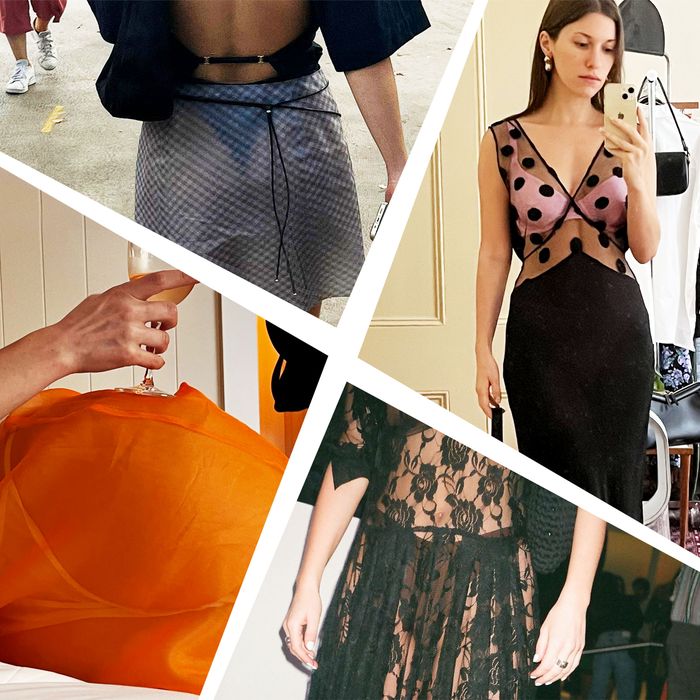
Photo: Courtesy of Laura Reilly
It was around 90 degrees on the day of Maryam Nassir Zadeh’s spring ’23 show, held on a public tennis court on the Lower East Side in September. My butt was enclothed in a windowpane-sheer vinyl skirt from the brand’s spring ’21 collection that, despite offering onlookers an unobstructed view of the Jacquemus thong-bodysuit beneath, was fostering a climate of its own under the relentless sun.
I had only the vaguest cheek coverage (and wished for less), yet the runway one-upped me. “Maryam girls” circled the court wearing delicate translucent dresses, gauzy vests, and crocheted tablecloths wrapped like aprons, leaving their knicker-clad bums totally exposed.
It’s shows like this that have prompted trend media to warn that the current nude wave will escalate into a tsunami by next year: “The deconstructed memory of undergarments gone rogue, coming this spring to a sidewalk near you,” writes Vanessa Friedman on the absence of clothing during Fashion Month for the New York Times. And in WWD, a Lily Templeton headline reads “Skin In, Again, for Spring 2023.”
Data would suggest the movement is gaining steam. Tagwalk, a fashion search engine codifying runway trends, reports that 77 percent of spring ’23 shows featured sheer looks, while 59 percent included some iteration of lingerie. But what’s less tangible is capturing how fashion seems to be advancing into more inventive methods of clothing without being clothed. It’s as though next season’s undressing is graduating from accidentally on purpose to unmistakably intentional.
How much more naked could I possibly get?
A quick search through my photos would also suggest that my disappearing-clothes act can largely be traced back to the pandemic (though I wouldn’t go as far as attributing it to that): quarantine self-portraits in Collina Strada sheer shirts and Jacquemus cutout dresses, fleeing the city in translucent Priscavera skirts and Tropic of C underboob bikinis.
Then when things started opening up, having worn some new looks around my apartment, I was emboldened enough to wear them out: Subsurface whale-tail pants, pokey-nipple Pleats Please, midriff-missing Christopher Esber, braless velvet burnout Réalisation Par, and so, so many bralettes as tops. Lace and organza became my language, and I grew brave enough to reveal new parts of my body — not just a flash of bra or a length of leg. I showed my stomach!
See-through skirts and slip dresses became essential parts of my regular wardrobe, and I collected them like they were going to be currency one day. And, yes, my butt was very much out, foisted on the public in an orange Dries Van Noten number, an A. Roege Hove green tube, and a Michelle Del Rio pencil whose fringe peplum did little to conceal my rear end.
I even got married at City Hall wearing a white knit minidress, made by my friend Lauren Frauenschuh, positively littered with holes around the front and back. And my year of barely dressing crescendoed in a Halloween costume (I was this meme) that exposed the entire back half of my body save for a few strips of fabric fighting for their life.
The Lyst Index’s quarterly reports, which rank fashion products by shopping interest and social-media mentions, tell a story of increasingly “naked dressing” that begins in Q2 of 2021, when Prada’s denim bra ranked at No. 4. (From Q3 of 2018 up till that point, there were no relevant items that made the top ten.) The following season, Jacquemus’s cleavage-exposing cardigan was No. 7, superseded by Nensi Dojaka’s chiffon bustier at No. 6 in Q4 of 2021 and the next season by Miu Miu’s micro-mini at No. 3. In the most recent edition, Q2 of 2022, Jean Paul Gaultier x Lotta Volkova’s realistic-print naked dress weighed in at No. 3.
On-the-rise naked dressing has been lumped in with a soup of other mimics from Y2K being rehashed — low rise, cargo — but unlike those churnable trends, nudity (or at least partial nudity) brushes up against the wearer’s code of decency and, by extension, their moral undercarriage. In a society where women have long been assigned either Madonna or whore, bucking the expectation to be covered up rejects the good-bad binary and frees bodies from the question of virtue.
Letting my butt — the thing that pets and babies have — exist in public without being strictly cloaked isn’t sexual for me. In fashion, despite what copywriters everywhere would have you believe, nudity rarely has anything to do with sex anymore. Power, yes, and provocation, but is it designed to arouse the observer? Hardly ever, if we’re being honest.
It doesn’t escape me that I can participate in the undressing Olympics safely without fearing retribution from my community — or physical harm for that matter. Experimentation in using one’s body as fashion is a privilege that comes with being white, housed, and living in a liberal city like New York, which has spared me any negative impact on my livelihood or freedom.
But my “tee-hee” of a Paco Rabanne disc dress with nothing underneath is really in another league of body-baring from, say, Collina Strada’s nipple-clamp dress or the one-boob corsets seen at Di Petsa and Michaela Stark from the spring ’23 collections, while Bottega’s pantless tights-and-sweater look reveals a new state of undress we’ve yet to fully explore. Even Julia Fox’s CFDA Awards dress — basically a bikini with a shrug and falling-off skirt — seemed to invent a new kind of “fashion” nudity.
I’m afraid to admit that this latest batch of shows was indeed nakeder than the last, just as the critics warn — when I sat by Friedman at the Ester Manas show in Paris, she lifted her phone just once for a sheer, cutout, micro-minidress — so I don’t disagree with the forecast. The question that remains is What comes after that?
I predict the pendulum will begin to swing in the opposite direction to follow the lead of the decorated and layered Edwardian threads that brands such as Vaquera, Elena Velez, and Loewe are already beginning to show. But if not? Invest in sunscreen.

